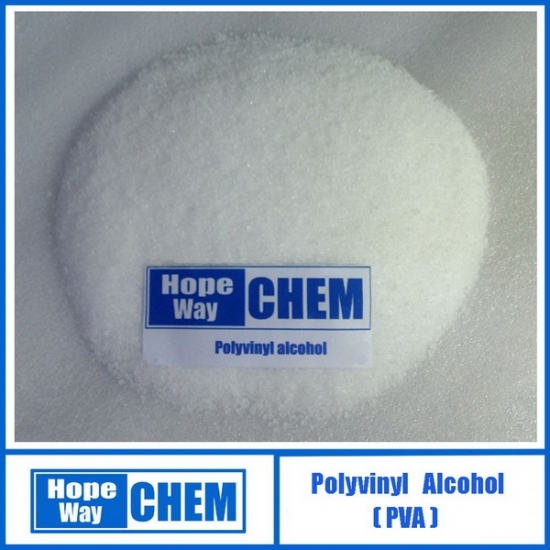- Home >> Polyvinyl Alcohol(PVA) >> price for polyvinyl alcohol HOPE WAY PVA HWF-20

HOPE WAY POLYVINYL ALCOHOL
Introduction
PolyvinylAlcohol (PVA) is a water soluble and biodegradable synthetic polymer. It is adry solid, and is available in granule and powdered forms. Grades include bothfully hydrolyzed and partially hydrolyzed. PVA is an excellent adhesive withsuperior bonding strength, film forming and emulsifying properties. The film ofPVA exhibits outstanding resistance to oil, grease and solvents. In addition toits film forming property, it has excellent adhesion to both hydrophilic andhydrophobic materials. PVA has been extensively used in textile industry forwarp sizing and resin finishing; in paper industry for surface sizing andpigment coating; in the production of PVAc emulsion as protective colloid; inthe suspension polymerization of PVC as a dispersion agent; as binder for ceramics,magnet, foundry cores and pigments.
PVA is manufactured by polymerization of vinyl acetate monomer, byhydrolysis of the polyvinyl acetate. HOPE WAY PVA is produced in a wide rangeof hydrolysis and polymerization. In the partially hydrolyzed grades, 86-89mole% of acetate group is replaced by alcohol group. Likewise, in the fullyhydrolyzed grade, 98.0~99.0 mole % of acetate group is replaced by alcoholgroup.
IndividualPVA grade varies in molecular weight (degree of polymerization) and degree ofhydrolysis. In order to help our valued PVA users to choose the mostappropriate grade, HOPE WAY has defined HOPE WAY PVA grade as following:
HWF-17: Fully hydrolyzed PVA with degree of polymerization about 1700.
HWP-20: Partially hydrolyzed PVA with degree of polymerization about 2000.
The most important properties which the majority of applications depend aredegree of polymerization and degree of hydrolysis. The degree of polymerizationis an expression of the size of polymer. The higher the degree ofpolymerization of polymer is, the bigger the size and the longer the length ofpolymer is. Similarly, the degree of hydrolysis is an expression of the ratioof hydrophilic alcohol group and hydrophobic acetate group.
The properties of PVA are summarized as follows.
■ The higher the degree of polymerization of polymer is, the better protectiveability is.
2. Based on degree of hydrolysis- Dissolving properties
■ Super low hydrolyzed grade PVA (HWC type) can be dissolved in 25°C to 50°Cwater, according to their grades.
■ Dissolving rate is slower than HWP type PVA.



